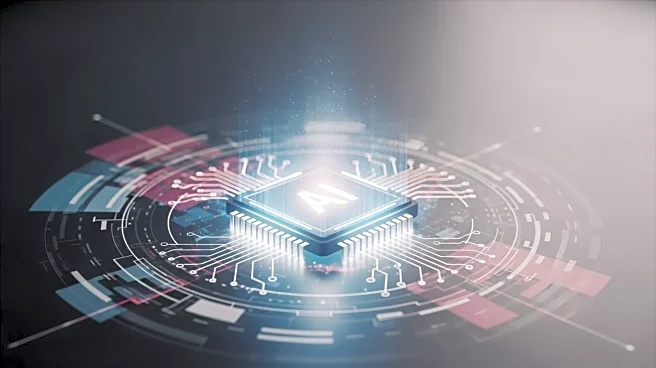What's Happening?
Nvidia CEO Jensen Huang has forecasted a significant transformation in the corporate workforce, driven by the integration of artificial intelligence (AI) agents alongside human employees. Huang envisions
a future where AI agents undergo formal hiring and onboarding processes to assimilate into a company's culture, potentially creating a market worth trillions of dollars. He anticipates digital roles such as nurses, accountants, lawyers, and marketers will become commonplace, with AI agents sourced from platforms like OpenAI and Replit, or developed in-house. Huang's comments align with Salesforce CEO Marc Benioff's prediction that future executives will manage both human and digital workers, and Anthropic CEO Dario Amodei's expectation that AI systems will surpass human capabilities by 2026 or 2027.
Why It's Important?
The integration of AI into the workforce could revolutionize industries by enhancing efficiency and productivity. Companies may benefit from reduced labor costs and increased innovation, while employees might face challenges adapting to new roles and competition from AI counterparts. This shift could impact public policy, necessitating regulations on AI employment and ethical considerations regarding AI rights and responsibilities. The potential for AI to outperform humans in various tasks raises questions about job security and the future of work, prompting discussions on retraining and education to prepare the workforce for this technological evolution.
What's Next?
As AI becomes more integrated into the workforce, companies will need to develop strategies for managing digital employees, including establishing protocols for AI onboarding and performance evaluation. Policymakers may need to address legal and ethical issues surrounding AI employment, such as liability and discrimination. The evolution of AI capabilities could lead to further advancements in AI technology, driving innovation across sectors. Businesses and governments will likely engage in ongoing dialogue to balance the benefits of AI integration with the potential societal impacts, ensuring a smooth transition to a mixed workforce.
Beyond the Headlines
The rise of AI in the workforce could lead to cultural shifts, as companies redefine their values and practices to accommodate digital employees. Ethical considerations, such as the treatment of AI agents and their role in decision-making, may become more prominent. Long-term, this development could influence global economic trends, as countries compete to harness AI's potential and address the challenges of a changing labor market. The integration of AI could also spur advancements in related fields, such as cybersecurity and data management, as organizations seek to protect their digital assets.









